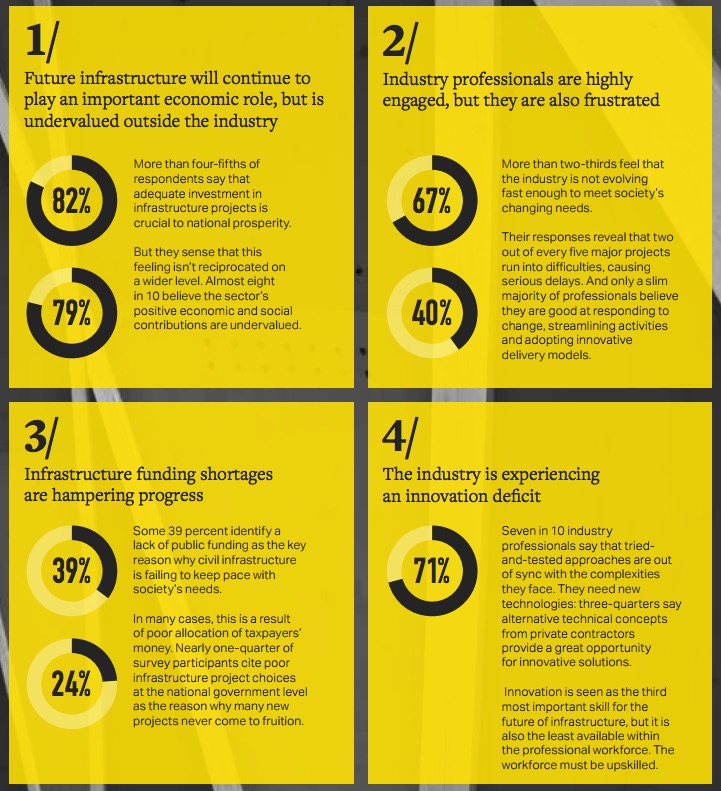AECOM
Executive Summary
AECOM’s new research comes at a time of unprecedented complexity and transformation, complicated by rapid urbanization, demographic change and the maturing of our digital age.
Growth, progress and change: Why the industry needs to speak up
We find an industry that is unified in its belief that infrastructure will play an important role in shaping the society of the future. Over 80 percent of the more than 500 professionals surveyed agree that national prosperity depends on civil infrastructure.
Respondents also recognize the harm that will be caused if the industry cannot deliver on its promises. Congested roads, unreliable and overcrowded rail services, power outages, drought, flooding, and cyberattacks cost individuals, communities and industries billions of dollars every year.
To encourage greater investment, the infrastructure industry needs to do more to promote the positive contribution that it makes to people’s lives. While government funding remains constrained, it is clear that work, including innovative funding models, is necessary to aid the flow of private money into public projects. More than one-third of global survey respondents cite funding shortages as the number one constraint in getting new projects off the ground.
A pivotal moment for infrastructure
Eight in 10 of the survey respondents agree that this is a pivotal time for civil infrastructure.
The industry must play a vital economic and societal role in supporting technological progress and shaping the communities of tomorrow. Our respondents share a willingness to embrace challenges and to develop fresh approaches to longstanding problems — and this must be done sooner rather than later.
Poor project and program management is also a major concern. A large majority of respondents feel that many tried-and-tested approaches fail to meet the requirements of today’s increasingly vast and complex civil infrastructure programs. A logical inference is that the industry needs to run major infrastructure projects very differently.
In addition to developing new ways of running projects, workforce skills are also clearly a concern. One quarter of the survey respondents cite skills and talent shortages as obstacles to progress, and about one-fifth say that difficulties sourcing the right talent cause major delays.
Building the resilient future
It is easy to get excited about the future. When considering transportation, for example, we all like to imagine a world of autonomous cars, digital railways that anticipate and help improve reliability, and Hyperloop links to usher in a whole new way of traveling.
Digital technologies and the Fourth Industrial Revolution are providing many of the tools we use; however, in today’s digital world, protection against cyberattacks is one of the most critical aspects of resilience. When asked about the likelihood of certain events in the next five years, survey respondents offer a sobering assessment. About one in three believes that catastrophic events — a major ransomware attack or city-wide transport disruption — are almost certain in the near future.
As a result, we need to upgrade existing networks and systems, as well as create new ones; embrace innovation in the ways we work and the infrastructure we rely on; and ensure that the infrastructure we create is resilient and future proofed to help withstand the shocks and stresses to come.
Change is coming fast. We must leap ahead to build a better world and make sure no one is left behind.
Key Findings
View full version (Infrastructure.AECOM.com): The Future of Infrastructure
About AECOM
www.aecom.com
“We are a global network of experts working with clients, communities and colleagues to develop and implement innovative solutions to the world’s most complex challenges.”
Tags: AECOM, AECOM Infrastructure Report, AECOM Infrastructure Survey, survey







 RSS Feed
RSS Feed